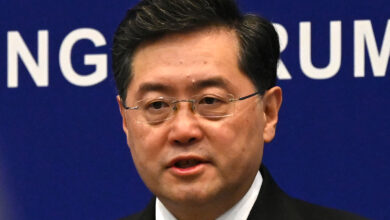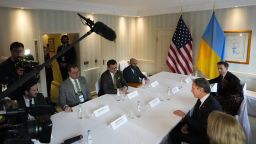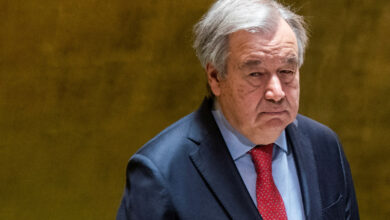Palestinian officials brushed aside a promised US veto and pressure to abandon their bid for UN membership, saying they were determined to take their case to the Security Council and realize a goal unfulfilled by decades of negotiations.
Senior aides to President Mahmoud Abbas said the Palestinians would not accept political delays in their membership bid, but acknowledged that final UN action might not be taken for months or even longer. Abbas was expected to formally deliver a letter requesting membership on Friday when his turn comes to speak to the UN General Assembly.
The issue was dominating the annual ministerial meeting of the world body as the diplomatic world swirled with speculation about what deals might be in the works. The United States, insisting that Palestinian statehood depends first of peace with Israel, has vowed to veto the Palestinian measure should it win the needed nine of 15 Security Council votes.
Teams of envoys from the United States, the European Union and France were engaged in frenzied, last-minute efforts to persuade Abbas to return to the negotiating table and make do with something less than full UN membership.
US President Barack Obama and Abbas met for more than 45 minutes Wednesday evening. The White House wouldn't say whether Obama directly asked the Palestinian leader to abandon his plans to pursue full UN membership, saying only that he reiterated his opposition to the statehood bid and the US intention to issue a veto.
So far there was no indication that Abbas was ready for compromise despite intense pressure, but his aides said they were not setting deadlines for the Security Council to consider the application. And they left the door open for a Plan-B request to the General Assembly for an upgrade of their current status as a permanent observer to a nonmember observer state.
That option is seen as the lesser of two evils by the US and others seeking to steer them clear from the Security Council for now.
"This is an option that is open to us … starting tomorrow, if we chose to do so, but President Abbas does not want anybody to suspect a lack of seriousness if we address the two councils at the same time," Palestinian negotiator and senior Abbas adviser Nabil Shaath told reporters. "So he will give some time to the Security Council to consider first our full membership request before heading to the General Assembly."
"We do not have a time limit," said Shaath. Nevertheless, he said, "This is a moment of truth."
Saeb Erekat, another senior aide, echoed that sentiment, saying the pursuit of UN membership would not be slowed: "We will not allow any political maneuvering on this issue," he said
That persistence has put the Palestinians on a collision course with the United States and Israel. A frustrated Obama told world leaders during his Wednesday UN speech that "there are no shortcuts" to peace.
A year ago, Obama made a case for Palestinian statehood. But in his speech he did not mention key issues such as an end to the construction of Jewish settlements in the West Bank or Palestinian demands that borders be drawn largely according to those that existed before the 1967 Mideast War.
"Peace will not come through statements and resolutions at the United Nations," Obama told delegates. "If it were that easy, it would have been accomplished by now."
But the Palestinians refused to accept that they could not negotiate peace after winning UN recognition.
Shaath said that "20 years after Oslo, we're still occupied" by Israel, a reference to the Oslo Accords that were intended to serve as a framework for future negotiations.
"The kind of freakish control the Israelis impose on us is unbelievable," Shaath said, referring to restrictions on movement between the Palestinian Authority-ruled West Bank and Hamas-governed Gaza. Israel and the United States say Hamas is a terrorist organization.
While Obama received a stoney reaction from the Palestinians, they warmed to a proposal by French President Nicolas Sarkozy. He outlined a plan that largely meshed with one drawn up by the European Union.
It called for a return to negotiations in a month, a broad agreement on other difficult issues in six months and a final agreement within the year. It also suggested the Palestinians seek a status upgrade through the General Assembly, where no member holds veto power. That would blunt the possible crisis that is feared if the US, as promised, vetos the Palestinian application in the Security Council.
And Sarkozy used tougher language with Israel than Obama, saying that the Jewish state must join the Palestinians in making difficult compromises.
Abbas spokesman Nabel Abu Rudeineh said no positions were changed late Wednesday when the Palestinian leader sat down with Obama.
According to Rudeineh's account of the meeting, Abbas again explained his reasons for seeking UN recognition. Obama told Abbas he remained committed to an independent Palestinian state, but said he should return to the negotiating table first.
As the United States, France and the European Union were all working on individual ideas, the Quartet of Mideast peace negotiators — the US, the EU, the UN and Russia — was likewise putting together a framework deal designed to tackle long-standing concerns of both sides.
As outlined, the Quartet deal would include a statement requiring Israel to accept its pre-1967 Mideast War borders, with land exchanges, as the basis for a two-state solution, and the Palestinians would have to recognize Israel's Jewish character if there was to be a deal, officials close to the talks said.
A spokesman for Abbas said the Palestinian leader told Obama on Wednesday that the Quartet statement would not meet his basic requirements to return to peace talks, in part because the Palestinians oppose recognizing the Jewish character of Israel.
Beyond that, the Palestinians would petition the United Nations Security Council on Friday, as expected, but would agree not to press for action on the request for statehood recognition for a year, or would withdraw it later. That would allow Abbas to save face and prevent an embarrassing defeat that might empower his Fatah party's rival faction, the militant Islamic group Hamas.
But the Palestinians do not seem to be interested in face-saving measures or solutions that fail to address their key demands and aspirations.
Abbas' aides said that if the first bid to win Security Council backing failed, they would try and try again, although they may take the case to the General Assembly as a stopgap measure.
In either case, Shaath said the Palestinians were "not ready to give up any of the rights afforded under the UN Charter, because this would provide a dangerous precedent." That meant that the Palestinians would still want the right to bring cases before the International Criminal Court, for example, a gain that Israel finds unappetizing since it would be the most obvious target of any such complaints.
The options, Shaath said, were either "full membership or near full membership."




